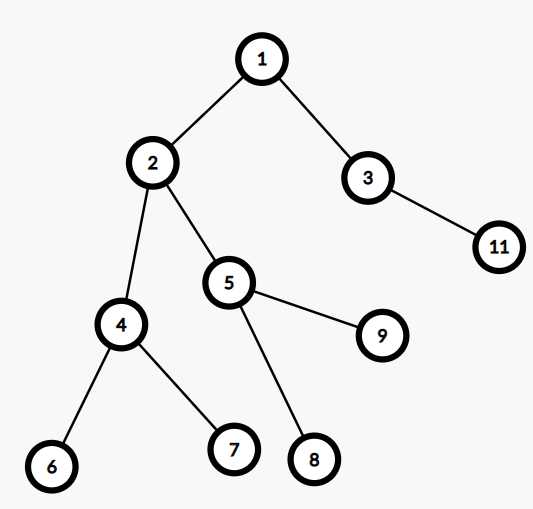最近公共祖先
Posted cutepota
tags:
篇首语:本文由小常识网(cha138.com)小编为大家整理,主要介绍了最近公共祖先相关的知识,希望对你有一定的参考价值。
tarjan算法:离线处理询问,核心思想是并查集。 如该图,现有4个询问:6-7,6-9,7-10,2-11

实现:1.先把询问数翻倍,除了本身的询问,还要增加两个点反过来的询问,即7-6,9-6,10-7,11-2。为什么要这样?因为在询问时,不知道两个点的先后顺序。
2.从根结点出发,做dfs遍历,遍历到第一个叶子结点时开始回退。每个结点回退前,查询该点有无询问,有则处理。回退时,进行并查集的合并操作。如上图,从1开始遍历,1-2-4-6,6准备回退前,查询有无6的询问,有6-7,6-9,看另一点是否访问,7和9均未访问,回退,1-2-4-6-4,此时fa(6)=4,继续遍历与4连接的点,1-2-4-6-4-7,此时查找有无关于7的询问,查询到7-6,6已访问,此时fa(6)=4,4即为7-6的最近公共祖先。fa(7)=4,继续回退,1-2-4-6-4-7-4,......,1-2-4-6-4-7-4-2-5-8-5-9,遍历到9时,回退前查询询问,有关于9的询问,9-6,此时6已遍历,查6此时的父亲点2即为9-6的最近公共祖先。
代码如下:
1 #include <vector>
2 #include <cstdio>
3 using namespace std;
4 inline int read()
5 {
6 int x = 0, f = 0;
7 char c = getchar();
8 for (; c < ‘0‘ || c > ‘9‘; c = getchar()) if (c == ‘-‘) f = 1;
9 for (; c >= ‘0‘ && c <= ‘9‘; c = getchar()) x = (x << 1) + (x << 3) + (c ^ ‘0‘);
10 return f ? -x : x;
11 }
12
13 const int N = 5e5 + 7;
14
15 int n, m, u, v, s;
16 int tot = 0, st[N], to[N << 1], nx[N << 1], fa[N], ans[N], vis[N];
17 struct note { int node, id; }; //询问以结构体形式保存
18 vector<note> ques[N];
19
20 inline void add(int u, int v)
21 { to[++tot] = v, nx[tot] = st[u], st[u] = tot;
22 }
23 inline int getfa(int x)
24 { return fa[x] == x ? x : fa[x] = getfa(fa[x]); }
25 //并查集的getfa操作,路径压缩
26
27 void dfs(int u, int from)
28 //u代表目前所在的点,from代表u的父亲点
29 {
30 for (int i = st[u]; i; i = nx[i]) //遍历与u相连的所有的边
31 if (to[i] != from)
32 dfs(to[i], u), fa[to[i]] = u; //将u的儿子合并到u
33 int len = ques[u].size(); //处理与u有关的询问
34 for (int i = 0; i < len; i++)
35 if (vis[ques[u][i].node])
36 ans[ques[u][i].id] = getfa(ques[u][i].node);
37 //处理与u相关的第i个询问,如果对应的v已访问
38 //找此时v的father,即为u,v的最近公共祖先
39 vis[u] = 1; //访问完毕回溯
40 }
41
42 int main()
43 {
44 n = read(), m = read(), s = read();
45 //n个点,m条询问,s为root
46 for (int i = 1; i < n; i++) //n-1条边
47 u = read(), v = read(),
48 add(u, v), add(v, u);
49 for (int i = 1; i <= m; i++) //m个询问
50 u = read(), v = read(),
51 ques[u].push_back((note){v, i}),
52 ques[v].push_back((note){u, i});
53 //记下询问编号便于输出
54 for (int i = 1; i <= n; i++)
55 fa[i] = i;
56 dfs(s, 0); //从s出发,访问
57 for (int i = 1; i <= m; i++)
58 printf("%d
", ans[i]); //输出答案
59 return 0;
60 }
以上是关于最近公共祖先的主要内容,如果未能解决你的问题,请参考以下文章